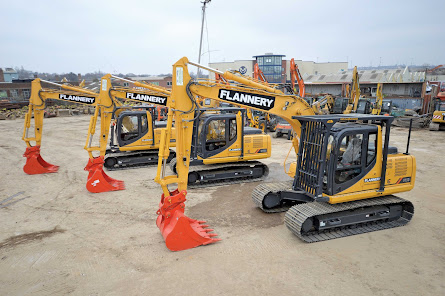If you're in the market for a custom truck body or equipment, there are many different options to choose from. You can find a wide variety of bodies and equipment that will fit your specific needs. Here are just a few examples of what's available.
When it comes to custom truck bodies and equipment, the sky's the limit. You can find all sorts of different options, depending on your needs. If you're looking for something specific, be sure to research your options carefully. There are many different companies that offer custom truck bodies and equipment, so you're sure to find something that fits your needs.
Truck bodies are the last stop for any load that needs to be transported.
They come in all shapes and sizes, with tasks varying depending on what kind of vehicle you're driving - but they always provide a strong carrying capacity!
Types of Truck Bodies:
1. Dump truck bodies
2. Platform truck bodies
3. Box truck bodies
4. Flatbed truck bodies
5. Tanker truck bodies
6. Livestock truck bodies
7. Refrigerated truck bodies
8. Cargo van truck bodies
9. Container truck bodies
10. Stake bed truck bodies
11. Moving van truck bodies
12. Landscape truck bodies
13. Snowplow truck bodies
14. Fire truck bodies
15. Ambulance truck bodies
16. Tow truck bodies
17. Garbage truck bodies
18. Recycle truck bodies
19. Waste removal truck bodies
20. Construction truck bodies
There are a variety of custom truck bodies and equipment out there, designed to meet the needs of different industries and vehicles. Some examples include:
1. Dump truck bodies, which are available in single- or tandem-axle versions. These allow you to easily transport loads such as dirt, gravel, sand, or other materials.
2. Platform truck bodies, which provide a large flat platform that can be used to carry all kinds of cargo. These are often used by construction and landscaping companies, which need to move heavy equipment and materials around the worksite.
3. Box truck bodies, which feature enclosed compartments for secure and protected transportation of valuable items. These are often used in the transport of sensitive goods, like electronics or pharmaceuticals.
4. Flatbed truck bodies, which offer an open and unobstructed space for carrying loads that are too large or awkward to fit in a traditional box truck. These are often used in the transport of lumber, steel, or other construction materials.
5. Refrigerated truck bodies, which feature insulated compartments that can be used to transport temperature-sensitive items. These are often used in the food and pharmaceutical industries, as well as for general shipping purposes.
6. Tanker truck bodies, are designed to hold large volumes of liquids. These are used in a variety of industries, including agriculture, oil and gas, and chemicals.
No matter what your needs are, there's sure to be a custom truck body or piece of equipment that can help you get the job done!
No matter what kind of truck body or equipment you need, there's sure to be a custom option that can meet your needs.
So if you're looking to get the most out of your truck and its hauling capabilities, consider investing in a custom truck body or equipment today!
Looking for a way to maximize your truck's hauling capabilities? Consider investing in a custom truck body or equipment! Whether you need to transport sensitive goods, heavy materials, or oversized items, there's sure to be a custom solution that can meet your needs.
So why wait? Get started today and find the perfect custom truck body or equipment for your needs!
Overall, custom truck bodies and equipment can be a great solution for businesses that need to move large or heavy loads around efficiently and securely.
Whether you're transporting dirt or precious cargo, there is likely a truck body out there to suit your needs!
Do you have any other examples of custom truck bodies and equipment that we didn't mention here? Let us know in the comments below!
There is a wide variety of custom truck bodies and equipment available, designed to meet the needs of different industries and vehicles.
Whether you need a dump body for transporting heavy loads like dirt or gravel, a flatbed for moving large construction materials around the worksite, or a specialized unit for carrying sensitive cargo like pharmaceuticals or electronics, there is likely a truck body out there to suit your needs.
So if you're looking for a way to transport large and heavy loads with ease, consider investing in custom truck bodies and equipment!
Trucks come in all different shapes and sizes, but they can be divided into three major categories: dump truck bodies for carrying away waste; platform vehicles with metal stakes that provide stability when loading or unloading cargo onto trucks bedded down at ground level; insulated refrigerated units designed specifically to carry perishable goods like foodstuffs.
No matter what your industry or needs, there is sure to be a custom truck body or piece of equipment that can help you get the job done!
So why wait? Invest in a custom truck body or equipment today and start maximizing your truck's hauling capabilities.
Whether you need to transport sensitive goods, heavy materials, or oversized items, there's sure to be a custom solution that can meet your needs.
So why not start exploring your options now? Get started today and find the perfect custom truck body or equipment for your need
Conclusion:
Custom truck bodies and equipment can be a great solution for businesses that need to move large or heavy loads around efficiently and securely.
Whether you are transporting sensitive goods, construction materials, or agricultural products, there is likely a specialized truck body or piece of equipment to suit your needs. So why wait? Invest in custom truck bodies and equipment today



.jpg)





